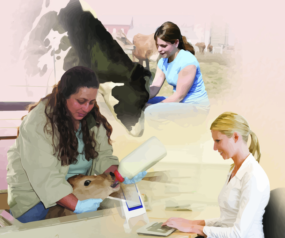Respiratory disease is not a threat exclusive to the calf barn. It can occur in adult cows, too. In fact, pneumonia is to blame for 11 percent of adult cow deaths, according to a USDA dairy producer survey. Fortunately, these losses can be minimized with good management and herd health practices.
Pneumonia in adult cows: How often does it occur, and what are the signs?
While a significant amount of research has been done to determine why dairy calves develop pneumonia, very little research has been done to determine why adult cows develop pneumonia.
This is likely because pneumonia in cows is less common than problems like mastitis, milk fever or lameness. However, pneumonia in adult cows can sometimes be a serious problem for an individual producer.
Outbreaks of pneumonia that lead to the death of one or more adult dairy cows have been described. In these outbreaks, cows are sometimes seen to have signs of pneumonia, which include fever, rapid breathing rate, abnormally deep breathing or breathing with an open mouth.
Cows with pneumonia are usually less active and less interested in eating than normal. Cows with pneumonia sometimes cough, and they may have a snotty nose, but these signs are not always present.
Lactating cows with pneumonia are likely to have a noticeable decline in milk production. However, it is possible for cows with severe pneumonia to die before any abnormal signs are noticed.
It is important to note that the signs of pneumonia can be very non-specific; a cow with pneumonia may have only a fever and decreased appetite. However, such signs can also be caused by infections elsewhere in the body.
Therefore, if a cow dies after having non-specific signs of illness, or if a cow dies unexpectedly, it is very important to ask your veterinarian or local veterinary diagnostic laboratory to do a necropsy (animal autopsy) on the dead cow.
If you are not currently having cows that die subjected to necropsy, talk to your veterinarian to develop a plan to more regularly use this valuable practice.
What is pneumonia, and why does it matter?
Pneumonia (also called bovine respiratory disease or BRD) is a common cause of sickness and death in cattle. Pneumonia is costly to producers because most cases require treatment with antibiotics, which can be expensive.
Moreover, milk from cattle treated with antibiotics must be discarded for some period of time, which is an additional expense. Calves that develop pneumonia often do not grow as well as their healthier herdmates, and dairy heifers that develop the disease may have their first calf later.
The term “pneumonia” means inflammation of the lungs. Inflammation is not always caused by infection, but in cattle, most cases of pneumonia are due to infection of the lungs by either viruses or bacteria.
The viruses or bacteria that most often cause pneumonia circulate among cows, just as viruses that cause the common cold circulate among people.
Cows or calves that are exposed to new cows or calves from other sources, such as when newly purchased animals are introduced to a farm, are especially likely to be exposed to respiratory viruses or bacteria that can lead to pneumonia.
However, exposure to viruses and bacteria alone is not usually enough to cause pneumonia. In addition to mixing with cattle from other sources, factors that are known to increase susceptibility include recent transport on a truck or trailer, inadequate immunity, poor nutrition and poor air quality.
The relationship between transport and pneumonia is the reason pneumonia is sometimes called “shipping fever.”
Pneumonia can occur in individual cattle alone or it can occur in outbreaks that affect multiple animals. A severe pneumonia outbreak can be devastating, leading to the death of multiple animals and the treatment of many more.
How can pneumonia be treated or prevented?
Most pneumonia in cattle is due in part to infection by viruses or bacteria. Just as when people develop the common cold, which is due to viruses, cows with viral infections are usually not treated with antiviral drugs.
Cows with a viral infection need “supportive care” – that is, they should be relieved of any and all unnecessary stress, such as shipment or mixing with other animals. These vulnerable animals should have easy access to good-quality water and food as well as adequate shelter from extremely hot or cold or wet weather while they are given time to recover from the viral infection.
Because bacteria can also contribute to pneumonia, cattle with pneumonia generally should be treated with an appropriate antibiotic. However, it is important to use the correct dosage and to observe withdrawal times for milk and meat when antibiotics are administered. Talk to your veterinarian about an appropriate protocol for treating cows that have pneumonia.
Perhaps the most important factor to ensure successful treatment of cows with pneumonia is timely treatment. Close attention to the herd to identify cows that have subtle signs indicating possible pneumonia is key to early identification and treatment.
Cattle with early-stage pneumonia will almost always have a fever (temperature greater than 102.5°F for an adult cow, or greater than 103°F for a calf), so if a cow looks a little off, it is worthwhile to take her temperature with a rectal thermometer to see if she has a fever.
If you have not already done so, work with your veterinarian to develop protocols for regular evaluation of cows and calves to rapidly identify and appropriately treat individuals that may have pneumonia.
To prevent pneumonia, try to protect cows from the factors listed above that increase their likelihood of pneumonia. However, some of these factors, like transport and mixing with cattle from other sources, cannot always be avoided.
When cows or calves must be transported or mixed with cattle from other sources, they may be more likely to resist disease when they are in excellent health, and when they are being fed appropriately to be in good body condition for their stage of life.
Additionally, vaccines are available to improve the specific immunity of cows and calves to the viruses and bacteria that contribute to pneumonia. (See sidebar below.) PD

Amelia R. Woolums
Department of Large Animal Medicine
University of Georgia
Vaccines are available to improve the specific immunity of cows to the viruses and bacteria that contribute to pneumonia. The common respiratory viruses for which vaccines exist in the U.S. include:
- Infectious bovine rhinotracheitis virus (IBR), also known as bovine herpesvirus-1 (BHV-1)
- Bovine respiratory syncytial virus (BRSV)
- Bovine viral diarrhea virus (BVDV)
- Parainfluenza type 3 virus (PI-3V)
There are other viruses that can cause respiratory disease in cattle for which approved vaccines do not currently exist; this is one reason that cows that have been vaccinated may still develop respiratory disease.
There are also vaccines that protect against these bacteria that commonly cause respiratory disease:
- Mannheimia haemolytica
- Pasteurella multocida
- Mycoplasma bovis
- Histophilus somni
As with viruses, there are some bacteria that can cause pneumonia for which vaccines do not exist.
While vaccines can improve the immunity of cattle and help them resist respiratory infection, dairymen should keep the following points in mind:
- Read label directions carefully, as some vaccines can cause pregnant cows to abort.
- Evaluate the proven efficacy of a vaccination.
- Cows may temporarily drop off in milk production after receiving vaccinations.
Give vaccines time to protect the animal. The strongest response occurs at least two weeks after the vaccination is given.
- For the most reliable protection, the cow should receive two doses of the vaccine, separated by approximately four weeks, before they are exposed to infection.
Moreover, vaccines that are appropriate for a herd depend on the way that herd is managed and the likelihood of exposure of cows to the infectious agents in the vaccines. Certain vaccines will be appropriate for use in some herds but not in others.
Because of all these issues, you should talk with your veterinarian to determine whether respiratory vaccines are appropriate for your cows and to determine when they should be administered.







